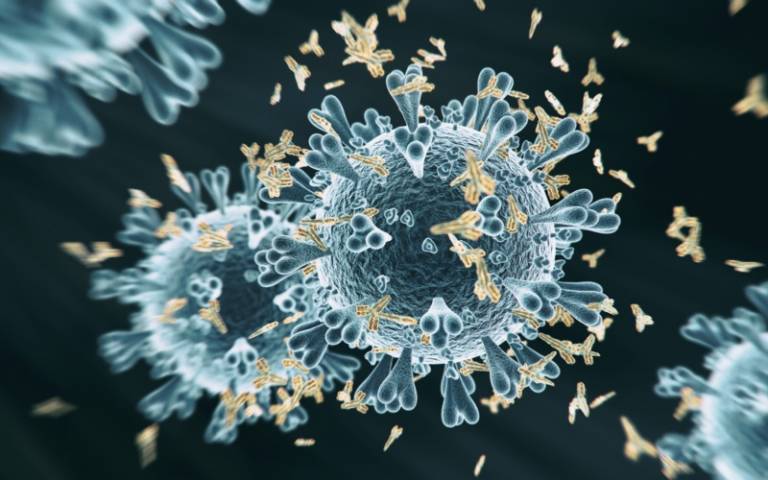UCL engineering cancer antibody therapies for Covid-19
17 June 2020
UCL’s Cancer Institute is repurposing a sophisticated antibody engineering approach, funded by the UCL Technology Fund (UCLTF), to research and develop a new treatment against Covid-19.

A new project, led by Dr Martin Pule, Senior Lecturer in Haematology and Professor Kerry Chester, Department of Oncology, will investigate pivoting existing research used in the fight against cancer by creating a unique ‘cocktail’ of recombinant antibodies capable of preventing the virus from entering cells and removing it from circulation.
Scientists will identify and clone the antibodies from genetic material produced by white blood cells from recovered Covid-19 patients who have made effective antibodies to the virus. The work involves extracting, amplifying and then analysing the antibody genes from many millions of cells - and using this information to create vast antibody libraries from which to choose the few specificities that will provide an effective combination.
The team has the technology and knowledge acquired from 20 years' experience developing antibodies for cancer treatment, where monoclonal antibodies have for long been a standard component of treatment. The challenge posed by this new research initiative is to find the perfect combination of cloned antibodies that will work synergistically to prevent mutation-based viral ‘escape’ from the treatment whilst avoiding unwanted side effects. Fortunately, high throughput antibody technology will allow the team to generate antibody libraries rapidly and functionally select the winners from literally thousands of millions of different antibody specificities.
When selected, the new antibodies will be further engineered for optimal effectiveness and for reproducible manufacture at large scale. So, unlike recovered-patient serum, the new antibody cocktail can be developed as a safe defined drug. The aim is to fine-tune the antibodies to minimise risks of toxicity and to include mechanisms promoting ‘vaccine-like’ protection.
Recovered-patient serum has for decades provided an approach to treating infectious diseases and providing protective immunity in patients who require treatment where there are no alternative approaches available. However, there are a number of significant limitations to this strategy, including reproducibility, scarcity of patient serum and scalability of the process.
Professor Chester commented, “We urgently need potent and safe methods for clearing the virus from infected individuals – and protecting people from infection in the first place. This is particularly important for patients with cancer who can be more vulnerable to the disease. A vaccine may be a long way off and not everyone will be able to make an effective immune response. We’re working fast to develop a treatment which is both an effective therapy and a prophylactic for Covid-19.”
The UCLTF is managed by AlbionVC in collaboration with UCL Business (UCLB) - the university’s commercialisation company and part of UCL Innovation & Enterprise. The fund supports UCL in achieving the full potential of innovations that have prospects for outstanding societal impact.
Dr Anne Lane, CEO, UCLB said, “By enabling this collaboration we are engaging world-leading cancer research in the fight against Covid-19. Our mission is to commercialise the exceptional ideas of UCL researchers, to benefit society and the economy – and this initiative from UCL’s Cancer Institute is a fabulous example.”
Dr Celia Caulcott, Vice-Provost, (Enterprise) added, “We are delighted to be in the unique position of being able to open up the expertise of the UCL Cancer Institute researchers to pivot cancer antibody engineering know-how towards the challenge of the Covid-19 virus.”
The Covid-19 pandemic has had an unprecedented effect on the entire health service and cancer services are no exception. Cancer patients themselves are vulnerable, with a weakened immune system as a result of both their underlying diagnosis and often because of the treatment they are receiving. Therefore, research into potential treatments for Covid-19 infection is of paramount importance to all patient groups, including cancer patients.
Links
Image
- Source: Koto Feja
Media contact
Kate Clark
Tel: +44 (0)7990 525639
Email: kate.clark [at] ucl.ac.uk
 Close
Close

